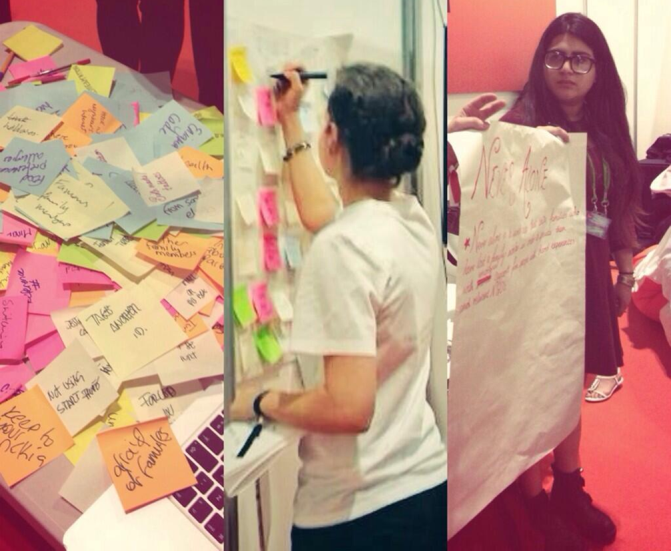This is the last in a series of 3 blog posts about the Global Summit to End Sexual Violence in Conflict. See blog 1 and blog 2.
“Hi, Marjourie how are you?”
“Hi, I’m fine, thank you Toby”
“How are things in Goma (East DRC) today?”
“Fine…not good actually…we had a busy night. Four more women arrived last night. They had been raped and came to our shelter…”
That was how a conversation with one of the overseas participants started during the hackathon* #EndSVCHack. It was a hackathon like no other bringing together participants from all over the world in the Excel Centre in London in support of the Ending Sexual Violence in Conflict Summit. The “diplohack” event was jointly hosted with the Dutch government and facilitated by volunteer group Chayn.
But can technology or an app really help tackle an issue as sensitive and difficult as this? This was the crucial question that was tackled by the developers, subject matter experts, designers and diplomats who volunteered their time over an intensive 72hrs.
To help break down the problem we set the ‘hackers’ to work looking at solutions to help support the core aims of the Global Summit to End Sexual Violence in Conflict, in summary:
* Improving the reporting and documenting of Sexual Violence
* Supporting survivors
* Promoting Gender Equality
* Improving collaboration between organisations
The 60 participants went through an “ideation” phase – think lots of stickers, shouting (and a visit from the Foreign Secretary and Angelina Jolie, Special Envoy for the UN High Commissioner for Refugees). The participants voted on the best crowd sourced ideas, worked with technical specialists and subject matter experts such as Marjourie to define how the ideas could become real technological solutions and formed themselves into six teams.
Eight hours into the event the teams settled in to the “build” phase to further research, plan and develop their ideas into prototypes. It was particularly good to see them consult with the wealth of experts around them in the Summit Fringe. In addition to building their prototypes the teams also had to develop their pitches for both the people’s choice video and the judging panel.
So could any of the tools developed really help someone like Marjourie or the women that she provides shelter for?
The winning ideas were:
The Promise – winner of the Judges Award (£1500 seed funding): An online platform that would allow a survivor of sexual violence to send a text message or dial a hotline number and receive information on the nearest available shelter with capacity to help them.
Seekr – winner of the people’s choice award (£500 seed funding): A proposed database to help NGOs identify missing people drawing on facial recognition.
Kahani – winner of the best pitch award: An interactive web platform to help educate communities on how to deal positively with this trauma by giving different perspectives on the impact of sexual violence on survivors; their children, community leaders, parents and siblings.
And the runners up were:
Protected Flowers – A game that allows coded support messages to be sent to victims.
Safe Track – A crowdsourcing militia-monitoring and community alert system.
Step Up – A platform to connect skilled volunteers with NGOs for volunteering opportunities.
Marjourie, like the judges was impressed with all the ideas and the energy and commitment from all the participants. The Promise was chosen for the main prize by the judges because of the immediate possibilities to apply the tool and its singular focus on helping survivors of sexual violence.
We all know that prototypes are all very well, but that they need to be developed, tested and refined to make a real difference. So the Dutch government, CHAYN and Foreign Office will continue to support the teams, helping put them in touch with the right people and hopefully maximising the likelihood that the winning ideas are successful.
As the work on the projects continue you can keep up to date at www.endsvchack.com – any funders out there can also contact the teams directly through that site. You will also be able to find details as they are confirmed of the event we will be holding in October to look at the progress of the teams.
For us in the FCO this second hackathon event (FCOHack was the first) demonstrates the value external expertise can bring to help build solutions to Foreign policy problems. We won’t promise they will be bigger and better each time and that superstars will always drop in, but we are definitely interested in how we can tackle problems in new ways. If you have a great idea for a topic we could run a hackathon around, please do let us know in the comments below.
Video courtesy of Videau
*A hackathon is a competitive event where a group of developers and subject matter experts are brought to the same location and given a set of data, a challenge, an idea or a theme. For 24, 48 or 72 hours they undertake an intensive piece of research and programming resulting in working software.

